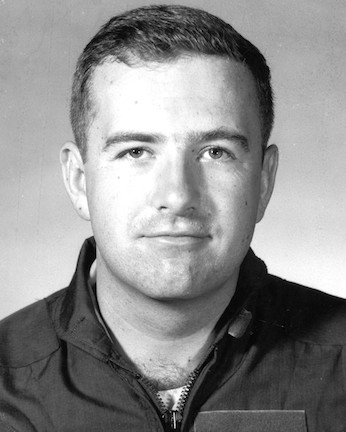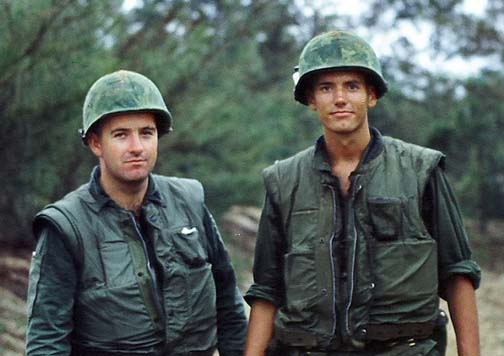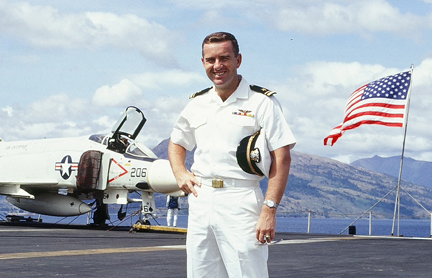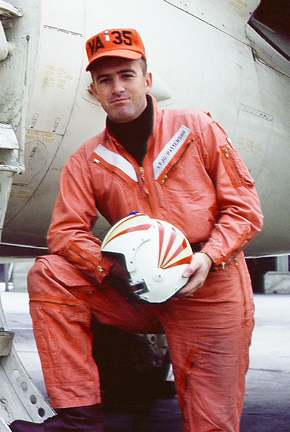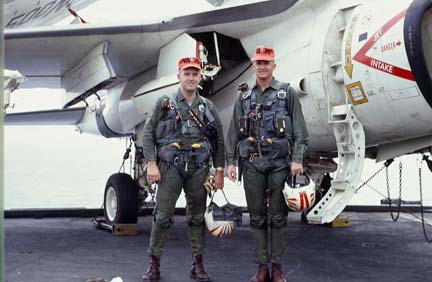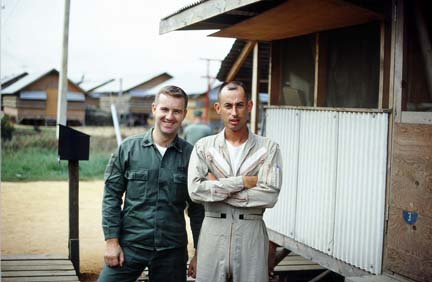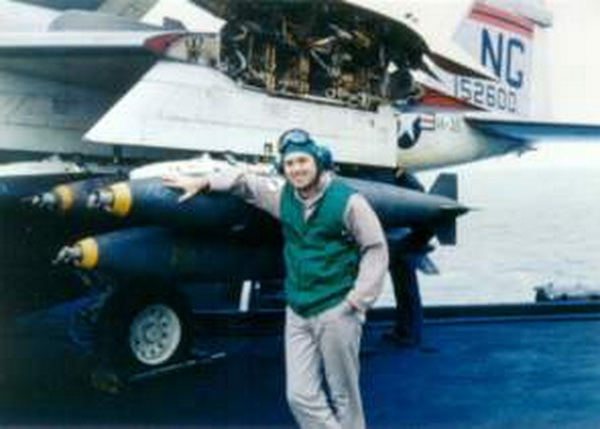JAMES K. PATTERSON, LCDR, USN
James Patterson '63
Lucky Bag
From the 1963 Lucky Bag:
JAMES KELLY PATTERSON
South Pasadena, California
Jim hails from the Pacific side of the country. Having been a Navy Junior for the first eighteen years of his life, he has seen a good portion of the world, but Jim still claims the "best is in the west." After graduating from South Pasadena High School in California, Jim spent a year at Pasadena City College, where he majored in pre-engineering. Upon reporting to the Academy, he found it relatively easy adjusting to the demanding routine of his new home. Sportwise, he enjoyed competing on the intramural level. He was a member of company cross-country, battalion squash, and softball teams. Jim says that his real love in life is aviation. He supported the Aeronautical Club and insists that the greatest time he ever had was at Pensacola during his Second Class Aviation Summer. An avid model airplane builder and a man with a good number of flying hours under his belt, Jim is now a full fledged member of the "Navy Air is mighty fair" set.
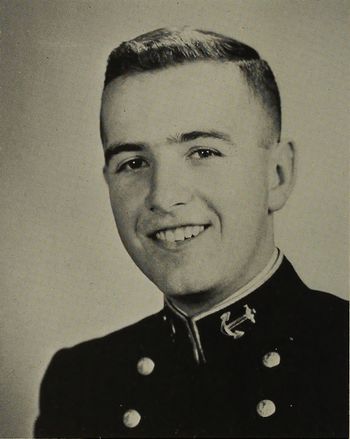
JAMES KELLY PATTERSON
South Pasadena, California
Jim hails from the Pacific side of the country. Having been a Navy Junior for the first eighteen years of his life, he has seen a good portion of the world, but Jim still claims the "best is in the west." After graduating from South Pasadena High School in California, Jim spent a year at Pasadena City College, where he majored in pre-engineering. Upon reporting to the Academy, he found it relatively easy adjusting to the demanding routine of his new home. Sportwise, he enjoyed competing on the intramural level. He was a member of company cross-country, battalion squash, and softball teams. Jim says that his real love in life is aviation. He supported the Aeronautical Club and insists that the greatest time he ever had was at Pensacola during his Second Class Aviation Summer. An avid model airplane builder and a man with a good number of flying hours under his belt, Jim is now a full fledged member of the "Navy Air is mighty fair" set.
Loss
From usna63.org:
On May 19, 1967 McDaniel was the pilot and Patterson the bombardier/navigator sitting to his right aboard an A6A with a mission to bomb a truck repair facility at Van Dien, Hai Duong Province, North Vietnam. The aircraft was shot down, but both crew members ejected safely from the aircraft and established voice radio contact with other aircraft in the area.
Lt. Patterson badly broke his leg upon landing, but maintained radio contact with rescue forces for a period of three days, May 19th, 20th, and 21st. They couldn't raise him on the radio on the 22nd, and cancelled further rescue efforts. On May 21, he reported that enemy forces had taken a recovery kit which had been dropped to him and that he had moved up a hill for safety. Lt Cdr. McDaniel was taken prisoner by the North Vietnamese and taken to Hanoi.
There is much more at the site, with extensive searches for Jim decades after the war.
It is important to note that, though the Department of Defense lists his date of loss as May 19 — the date he was shot down — he was alive until at least the evening of May 21. In fact, there is no evidence he was killed while being captured, or that he died of his injuries.
Jim is listed at the Courts of the Missing in Hawaii (also at this link).
Photographs
Remembrances
From Jim Ring '63 via email on April 8, 2021:
In September, 1959, at the end of Plebe Summer, I was randomly assigned to a room in the 7th Company on the second deck, third wing of Bancroft Hall to start the rigorous plebe year at the United States Naval Academy. When I walked into the room, I found my new roommates were James Kelly Patterson from California and Peter Lee Rollosson from Arkansas. We introduced ourselves and found out where each of us came from and the familiar name we would use during our next four years, if we would make it that long. (When we arrived we were told to look to our left and right, one of us would not be here four years later and it was true.) Jim (later called Kelly) and Pete and I talked about our concerns about the coming plebe year and whether we would be one of the three to no make it. It was understood among us that we would each protect the others back – we would start the bond that would last a lifetime.
The first dinner we had when the rest of the Brigade came back was one of the most frightening evenings we experienced because then three or four of us would be assigned to a 12 man table with 8 or 9 upper classmen who could vent their wrath on us. We had to sit on three inches of our chair in an erect position with our chins tucked tightly in. The food was served and plebes were responsible for passing the food from the most senior one to the junior ones. We got what was left over. When the three of us got back to the room, we were excited that we had survived the rigors of that first meal.
Football was a big sport at the Academy and we learned the week before the game, that all plebe rooms were required to develop a poster and hang it on our door. The poster was to feature something about how we were going to beat the football opponent next weekend. To the surprise of Pete and me, we found out that Jim was a great artist and also had a knack for developing great ideas to be used on the poster. For fear of running into an upperclassman, we didn’t roam the halls to find out what the other plebes in our company had drawn. So we were pleased to learn that for the first week, we had won. This meant that the poster would be exhibited in the rotunda of Bancroft Hall with the ones from the 23 other companies for all visitors to see. More importantly, it also meant that we were relieved our plebe duties for a day during the week (it was called we were granted “Carry on”). The next week, Jim came up with another good idea and made it into a cartoon and we won again. This continued week after week much to the chagrin of the upper class who didn’t like it that the same room was getting carry on each week. Finally they decided to do something different – they asked us to do a poem. I had gone to a Jesuit High School and one year at a Jesuit College, so I was experienced on writing poetry. It was my turn to excel and when we posted it, we found out we won again. We won every week that they had the poster contest.
As the year wore on, we adjusted to life as a Plebe and even though we had little free time, on the weekends, Jim and I would go to a movie in town or to one of the Navy sporting events on the Academy grounds. We were not allowed out on Saturday evenings, so, after dinner, we would be in our rooms studying. Around the corner from our rooms the members of the 10th Company were housed. The 10th Company had the reputation of being the worst on treating plebes in the Brigade. On many Saturday nights, some of the sophomores would stop in our room to give us their form of hazing. When upper class came into your room, you had to stand up at attention and say your name like “Midshipman Patterson, 4th Class, Sir”! These sophomores wanted to show how tough they were by asking us what Company they were from. We knew they were from the 10th Company, but we wanted to show we were tougher and would never give them the satisfaction that we knew their company. So we would say every company but the 10th Company. After each wrong answer they would pound our chests with their knuckles and ask us again. We never game them the satisfaction.
Because of our parents' concern about our welfare, they would send us “care packages”, including food items that they thought we would like including sweet items like cookies and candy. We always shared these goodies with each other. Jim’s parents sent him goodies that but also included avocadoes. Jim loved avocadoes and would eat them like a pear taking big bites out of them. I never liked (and still don’t) raw avocadoes, so Jim never had to share them with me.
Jim lived and breathed Naval Aviation. He knew a lot of trivia about aviation. As plebe year wore on and we had proved ourselves to the upper class, they would ask us to ask them to question them and see if we could stump them. If we did, we would get “carry on” for that meal. Jim always had aviation questions and they usually stumped the upper class and he would get carry on. One question stands out, “who holds the record for outside loops?” I can’t remember the answer. It was either Frank Tallman or Paul Mantz.
As the year wore on, Jim constantly talked about dropping out after plebe year and going to Naval Aviation training through the Naval Aviation Cadet program. It was called “NavCad”. In essence, one enlisted in the Navy and went through a training program at Pensacola Naval Air Base. Usually it only required two years of college to enter the program. Jim felt his one year at the Academy would qualify him. If you passed the program and became a Naval Aviator, you were commissioned as an Ensign. You also owed Navy Air another four years of active duty. If you didn’t pass, you went to the Fleet as an enlisted man. I tried to talk him out of that, but Jim had his mind made up, so I made plans to room with others for our second year.
I was truly surprised in September 1960, when Jim showed up to start his second year. Apparently his father, who was a retired Chief had talked him out of dropping out. After that year, Jim and I hooked up as roommates and for our third year, there would be only the two of us to a room, the first time I had less than three. All of us from '63 in the 7th Company rotated to a new company, the 16th, for a third year. The seniors in the Company had come from the above mentioned 10th Company and they continued their hard ass ways. Jim and I were not real tough on plebes, especially one in our Company who was being hounded by upper class. He became quite famous later – his name Roger Staubach. Roger would knock on our door and ask to come in and spend time before evening meal, just relaxing. We gladly granted his request. We just asked him to be quiet, so we could study. Since the NCAA rules did not allow freshmen to play varsity sports, we did not know how good Roger was until next year.
At the end of junior year, Lee Cargill and John Bender, who had been roommates during 2nd Class(junior) year, approached us and asked if they could join up with us for First Class (senior) year. Initially I didn’t want another four man room, but John and Lee indicated that only one of them would be in the room at a time, because, at times, during the year, they would be assigned to another room, because they expected to be given a Brigade leadership assignment. It worked out like they said. As graduation approached, we had to take our final physical which included determining if we were qualified for flight school. Jim did not pass the flight physical and he became deeply depressed. All he dreamed for had been wasted by staying another year at the Academy. He used to use to lie on his bed for long hours with a pillow over his head. Nothing the three of us could do anything but encourage him to get going.
After graduation, we went our separate ways, Jim went to a destroyer in Hawaii and I went to one in Long Beach, CA. I heard that he had gone to flight school from the Academy grapevine, but I did not hear any details. Then in May 1967, I happened to pick up a New York Times or Wall Street Journal. I don’t know why because I had rarely seen those papers in my life. There was an article about Naval Aviators flight over North Vietnam and reading closely I was astonished to see it was about Jim and Red. What a strange coincidence that I picked up the paper that day! The next month, my ship deployed to the Western Pacific and after four years at sea and three deployments to the Western Pacific and Vietnam, I was transferred off the ship in Sasebo, Japan in late July 1967. I was sent to Tachikawa AFB in Japan awaiting for my flight to USA. One night I went into the Officer’s Club for dinner and who should I run into but Luck. When I asked Luck what he was doing there, he told me that Jim had been shot down in May and was missing. Lacking the internet then, this was the first time I heard it. I was very upset and expressed my concern to Luck and I told him to pass that along to his family.
I feel like what Mike Cronin, our classmate and former POW, said at the Memorial for our fallen classmates at the Vietnam Wall in June 1995. “Now after all these years, it may be easier to understand what they lost. Look around, they lost all what we have had over these years. They lost the chance to have families, careers, dreams, hopes, victories, failures, disappointments and even loves.""
How sad, all in the 16th Company have missed him at all the reunions, which we have had over the years. It would have been great to see him excel in whatever he might have done in life, because I know it would have been great.
In honor of him and our other classmates killed in Vietnam and the Line of Duty, the Class established the USNA Class of 1963 Foundation. It provided academic support for College tuition for 86 children of our deceased classmates all funded by classmates.
From Virtual Wall:
Kelly and I are classmates from the Naval Academy and we were in the first class that was allowed to go into Naval Flight Officer training direct from the Academy. I recall that there were six of us in that first group. Two of them are on this Memorial Wall.
Kelly and I were both on the USS ENTERPRISE for the WestPac cruise of 1966-67. We spent many an hour together trying to find a rationale for what and why LBJ was letting the politicians run the war. We could take pictures of the Surface-to-Air Missile Assembly site outside Hanoi, but it couldn't be bombed as they had Russian technicians there. The bicycle assembly plant two blocks down the street was OK to bomb. Kelly and I were both extremely frustrated with these restrictions.
I was in the same strike group the day Kelly was shot down. I am convinced that Kelly was captured and taken to Russia for interrogation. I am extremely proud that Kelly's brother Luck has kept the candle burning and has made several trips to North Vietnam and Russia following leads. I am proud that Kelly's classmates have had a part in financing these trips. I miss him and have his bracelet staring at me as I type this.
From a classmate, shipmate, and friend, Peter Carrothers, usna1963@aol.com, March 10, 2006
From USNA '63, a post dated February 1999 from his younger brother, Luck:
As soon as James Kelly Patterson was old enough to gaze skyward, airplanes and flying became his lifelong obsession. A talented artist, one of his earliest grade school paintings shows a barefoot, straw-hatted Huck Finn type walking along a country path, stringer of fish a-dragging, cane pole a-toting, and over his head, a jet airplane. His model fighters and bombers hung from our bedroom ceiling, frozen in combat. On weekends I was his captive assistant at the Rose Bowl parking lot where he flew his powered models. They all eventually crashed or flew out of sight, giving him an excuse to start building new ones. It's not surprising that the lowest point in his life came when he learned that Naval Academy study had ruined his eyes for pilot training. But he shook it off and, determined to be airborne, became, according to his commanding officers, a stand-out, inspired combat bombardier- navigator, one of the best in the business.
Maybe we were naive, but we thought the Vietnam issue was pretty simple: the communist North was poised to enslave the free South, our ally. America was right to intervene. And growing up siblings in a Navy family, entranced by every episode of "Victory at Sea", there was no question about it--Kelly and I were duty-bound to go, and would go willingly. So he shipped out for Southeast Asia in December of 1966 as a B-N in a carrier-borne A-6 squadron, and, Sullivan Act notwithstanding, I followed in January.
After dozens of truly harrowing missions over the north, and several citations for bravery and outstanding performance, Kelly earned a much needed R&R in April. But he left Yankee Station, not for Bangkok or Honolulu or Brisbane, but for Danang, South Vietnam. There he hopped a Marine convoy and found his way to my outfit in the bush.
Not unheard of, this was at least out of the ordinary. The Navy had invested a small fortune in his training, making him an expert in the use of the state- of-the-art electronics that was neutralizing Hanoi's air defenses. How he got approval for this trip, I don't know. Maybe he told his commanding officer he just wanted to see his kid brother in Danang.
He had always been a protective big brother, and here he was again, checking on my welfare, easing our folks' concerns. He found me as I was preparing my Marine rifle platoon for a three day patrol, and not to be denied a visit, asked to go along. So I issued him a helmet, flak jacket, and rifle, and at O-dark-thirty stepped out of our perimeter into Indian country, Kelly in tow to share my muddy war in the paddies.
Our time together was cut short when my platoon was choppered out to pursue an NVA force which had hit the Marines in the foothills inland, but the two days we had together were very special. When we could, we talked about home and family, and of course the war. Kelly was living his dream, flying a carrier based Navy warplane in combat. Saving the South Vietnamese from the horrors of Communism was reason enough for fighting. He had no animosity toward the common people of the north, and took extreme care (to his own hazard, I learned later) to avoid civilian casualties on his bombing runs. He didn't even mind that the anti-war groups at home were sending medicine to North Vietnam. Maybe some of it found its way to the villagers, he reasoned, and maybe they would return the favor some day.
I treasure the memory of these, as it turned out our final, hours together. Kelly's conduct as a Naval officer, as a warrior, and as a man, and most especially as a brother, was extraordinary. When I last saw him, through the rotor dust of a rising "Sea Knight" helicopter, he was riding atop an am-trac headed back to his war. On May 19, 1967, Kelly was shot down over North Vietnam. With his pilot, Eugene "Red" McDaniel, he ejected, and with a broken leg evaded capture for three days. Then he disappeared.
Elsewhere on the page, from Ed Sadowski, one of Kelly's VA-35 squadron mates:
Kelly was only a year older than I, so we got to be pretty good friends. Early in my first assignment in the Navy, I learned about this great deal called "per diem" when you went on temporary duty. Since ensigns made $222 per month then, I was more than happy to eat at McDonald's and collect full per diem whenever I went to a school, etc.
Then one day I spoke to Kelly about a two-week assignment he had been on where he was given full per diem, since the BOQ was regarded as sub-standard. He told me that he felt the BOQ was OK and he was going to give back the per diem money. (He incidentally had a tough time doing this and I think his final advice was to write a check to the U. S. Treasury, which I'm sure he did.) I was flabbergasted by his honesty. I had never before met anyone with this sort of integrity. He taught me a life lesson, and I have carried it with me for 40-plus years. I teach an adult Sunday School class at my church, and I have told them about Kelly many times. Your brother made me a better person, and I will never forget him. Kelly was a great man.
Distinguished Flying Cross
From Hall of Valor:
The President of the United States of America takes pride in presenting the Distinguished Flying Cross (Posthumously) to Lieutenant Commander [then Lieutenant] James K. Patterson, United States Navy, for heroism and extraordinary achievement in aerial flight on 10 April 1967 as a naval flight officer serving with Attack Squadron THIRTY-FIVE (VA-35), embarked in U.S.S. ENTERPRISE (CVAN-65), during aerial combat operations in Southeast Asia. Lieutenant Commander Patterson flew as leading bombardier/navigator on a predawn air strike against a vital and heavily defended steel mill in the heart of North Vietnam. By navigating his aircraft at dangerously low altitude in instrument flight conditions, over mountainous terrain, he successfully evaded enemy defenses until within six miles of the target. Disregarding four surface-to-air missiles fired as his aircraft and numerous antiaircraft-artillery shells bursting around and ahead of him, he maintained steady radar tracking of the target until bomb release, ensuring an optimum bombing solution. Because of his superb navigational and radar-bombing skill, his bombs found their mark and inflicted heavy damage upon the target. Lieutenant Commander Patterson's performance contributed materially to the disruption of enemy war materials production and was in keeping with the highest traditions of the United States Naval Service.
Action Date: 10-Apr-67
Service: Navy
Rank: Lieutenant Commander
Company: Attack Squadron 35
Division: U.S.S. Enterprise (CVAN-65)

The "category" links below lead to lists of related Honorees; use them to explore further the service and sacrifice of alumni in Memorial Hall.
